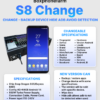Have you ever talked about a niche product with a friend, only to see an advertisement for it on your social media feed moments later? Or perhaps you’ve searched for a sensitive health topic, and suddenly, articles and ads related to that condition follow you across the internet. This isn’t magic or a coincidence. It’s the modern digital economy in action, an economy built on the currency of your personal data. In an age where our lives are increasingly lived online, the concept of online privacy has shifted from a niche concern for the tech-savvy to a fundamental issue that affects everyone. Understanding its importance is the first step toward reclaiming control in a world that wants to watch, track, and monetize your every move.
Privacy is a Fundamental Right, Not a Privilege
In the physical world, we instinctively understand the need for privacy. We close our curtains, lock our doors, and have private conversations without the expectation of being recorded. Online privacy is the digital extension of this fundamental human right. It’s not about having something to hide; it’s about having the freedom to be yourself without constant scrutiny. It is as essential to a free and open society as the right to free speech.
Think about it: the constant awareness of being monitored creates a “chilling effect.” When individuals know their searches, posts, and private messages could be collected and analyzed, they may start to self – censor. They might avoid exploring controversial ideas, engaging in political discourse, or seeking information on sensitive personal matters. This subtle erosion of intellectual freedom is a direct consequence of a world without meaningful online privacy. It limits our ability to form our own opinions, to express dissent, and to grow as individuals. Privacy creates the space for creativity, introspection, and the uninhibited exchange of ideas – the very bedrock of a democratic society.

Your Personal Data: The New Gold Rush
If you’re not paying for the product, you are the product. This adage has never been more accurate. In the digital economy, your personal data is an incredibly lucrative asset, the “new oil” fueling a multi – billion dollar industry. Every click, like, share, search, and location check-in is a data point. On their own, they might seem insignificant. But when collected and aggregated, they paint an astonishingly detailed portrait of who you are.
Here’s how it typically works:
- Collection: Tech giants, social media platforms, apps, and websites collect vast amounts of data through user agreements that are often long, complex, and rarely read. This includes your demographics, interests, browsing habits, location history, and even the content of your messages.
- Aggregation: This data is then compiled and analyzed by powerful algorithms. It’s cross-referenced with data from other sources – like public records and credit card purchases – to create a comprehensive profile.
- Monetization: This is the final step. Your detailed profile is used to sell highly targeted advertising. It can also be sold directly to data brokers, who in turn sell it to other companies, political campaigns, or organizations. All of this often happens without your explicit, informed consent for each transaction.
This business model means that powerful entities know your hopes, fears, political leanings, financial situation, and vulnerabilities. This information isn’t just used to sell you shoes; it’s used to influence your opinions, your purchasing decisions, and even your vote.
The Tangible Risks of Eroding Online Privacy
The consequences of poor online privacy aren’t just theoretical; they are concrete and can have devastating effects on individuals and businesses. Here are some of the most significant dangers.

Data Breaches and Cyber Attacks
The more companies that hold your data, the more opportunities there are for it to be compromised. A single weak link in the security chain can lead to a massive data breach, exposing sensitive information like passwords, financial details, and personal identifiers. For professionals in the MMO and digital marketing spaces, a breach can mean the loss of valuable accounts, client data, and operational security. Strong online privacy practices are your first line of defense.
Identity Theft and Phishing
Cybercriminals thrive on personal information. With just a few key data points – your name, address, date of birth, and perhaps a password from a breached site – they can begin the process of stealing your identity. They can open credit cards in your name, file fraudulent tax returns, or drain your bank accounts. Furthermore, they can use this information to craft highly convincing and personalized phishing attacks, tricking you or your employees into revealing even more sensitive data or installing malware.
Surveillance and Control
While corporate surveillance is driven by profit, state-sponsored surveillance is driven by control. The mass collection of data by governments, sometimes in partnership with tech companies, can be used to monitor citizens, suppress dissent, and enforce social control. In less democratic societies, this can have life-or-death consequences. Even in free societies, the potential for this data to be misused creates a climate of distrust and fear, undermining the very principles of freedom.
Core Principles of Data Protection
To combat these risks, robust data protection frameworks like the GDPR in Europe have been established. These frameworks are built on several key principles that should guide how any organization, including your own business, handles data.
- Purpose Limitation: Data should only be collected for a specific, explicit, and legitimate purpose. It cannot be repurposed later for something else without consent.
- Data Minimization: Organizations should only collect the data that is absolutely necessary for that specific purpose. A mobile game doesn’t need access to your contacts, and an e-commerce site doesn’t need your social security number.
- Security Safeguards: Any entity collecting personal data has a fundamental responsibility to protect it with appropriate security measures against loss, theft, and unauthorized access.
- User Rights (Access and Rectification): You, the individual, have the right to know what data is being held about you. You have the right to access it, correct any inaccuracies, and in many cases, request its deletion.
Understanding these principles is crucial for both protecting your own online privacy and for building trust with your customers if you run a business.
Conclusion: Reclaiming Your Digital Autonomy with the Right Tools
Online privacy is not a lost cause. It is a fundamental right that forms the bedrock of individual freedom, security, and a healthy digital society. The threats are real – from manipulative advertising and identity theft to widespread surveillance. But knowledge is power, and the right tools can help you reclaim control over your digital footprint.
For professionals in MMO, digital marketing, and business automation, managing digital identities is not just about privacy; it’s about operational security and scalability. At GenFarmer, we’ve built an entire ecosystem designed to empower you. Our solutions are grounded in a deep understanding of network protocols and the need for digital compartmentalization. Our Box Phone Farm hardware and Proxy Routers give you mastery over your network environment, while our Cloud Phone rentals provide the flexibility to scale operations without compromising security. With our automation solutions like GenFarmer Trust for account nurturing and GenFarmer Boost for engagement, you can execute complex strategies effectively and securely. Don’t let your data be a commodity for others to exploit. Explore the GenFarmer ecosystem and start building a more private, secure, and powerful digital strategy today.











